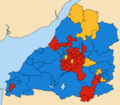Avon County Council | |
|---|---|
 | |
| History | |
| Founded | 1 April 1974 |
| Disbanded | 1 April 1996 |
| Succeeded by | Bath and North East Somerset Council Bristol City Council North Somerset Council South Gloucestershire Council |
| Meeting place | |
 | |
| Avon House, Bristol | |
Avon County Council was the county council of the non-metropolitan county of Avon in south west England. [1] It came into its powers on 1 April 1974 and was abolished on 1 April 1996 at the same time as the county. The county council was based at Avon House in Bristol. [2] It was replaced with four authorities: Bristol City Council, South Gloucestershire Council, North Somerset Council and Bath and North East Somerset Council. [3]



